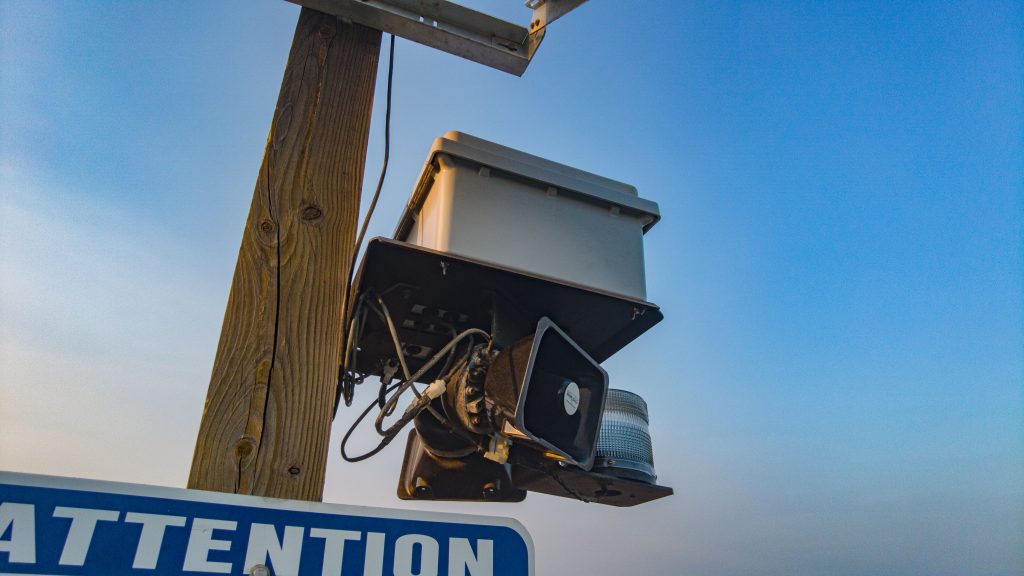Two weeks ago, Shorebeat recorded a short video (embedded above) as a strong thunderstorm passed by to the north of the island, which triggered the lightning detection system that was installed last year in Ortley Beach. This season, Lavallette will install its own unit on Philadelphia Avenue, networked with the Ortley Beach system. Before the system has even been activated, however, officials say beach staff and police officers are taking “abuse” by some angry beachgoers who refuse to pay attention to the warning.
“By law, if that goes off, our lifeguards need to leave the beach, which technically means it’s closed to swimming,” said Councilwoman Joanne Filippone.
As thunderstorms meandered through the region this weekend, lightning was in range of the detection system seven times. Ortley Beach, and soon Lavallette, will utilize the Strike Guard system. According to its specifications, the system can “see” a storm from about 10 to 20 miles out, and uses a graduated system to warn officials and beachgoers. An audible alarm sounds, in its default setting, if a strike is detected within five miles. Strikes can be detected in advance, so theoretically, guards may be obligated to occasionally close the beach even if signs of a storm are not visibly apparent.
While Lavallette’s unit has yet to be installed, guards are using the nearest detectors in Ortley Beach – which can be clearly heard in the southern part of town – to act as a guide. This has already led to confrontations on the beach this season, according to officials.
“We had people harassing some of the guards, and there was some abuse to the police as well,” said Borough Administrator John O. Bennett.
The police were called to the beachfront after some people became particularly angry, said Councilman Michael Stogdill.
“At some point on Sunday, there was a lot of ‘hand gesture abuse’ toward our lifeguards, and the police were called to assist and make sure people knew the beaches were closed,” he said.
While some systems utilize internet-based radar imagery to predict when lightning may occur, the Strike Guard system physically monitors the skies using a self-contained array. According to its manufacturer, Strike Guard differentiates lightning strikes between three categories:
- CAUTION: Lighting is within 20 miles.
- WARNING: Lightning is within 10 miles.
- ALARM: Lighting is within 5 miles.
To prevent false alarms, the system requires data from an electro-optical sensor to coincide with a magnetic-field-change sensor before reporting lightning. Data from the two sensors are fused, and can be used to control warning systems and to help personnel make evacuation and shutdown decisions.
Once such a system is installed, there are policy guidelines that govern how beach staff must react.
“When that goes off, the lifeguards have to leave the beach, and notify the patrons that it is strongly recommended they leave the beach,” said Stogdill. “Technically you don’t have to, but you’re doing so at your own risk. The lifeguards cannot go back on until 30 minutes after the last lightning strike.”
Local communities began installing lightning detection systems after the summer of 2021, when a South Seaside Park lifeguard was fatally struck by lightning – even though a storm was not over the area at the time.
“If you go back in history to the young man who died in South Seaside Park, the lightning was not here,” said Filippone. “It was eight miles away.”

A memorial set up at the 21st Street Beach in South Seaside Park honoring lifeguard Keith Pinto, Sept. 2021. (Photo: Daniel Nee)
Lavallette officials also noted that, unlike South Seaside Park at the time, Lavallette, Ortley Beach, Seaside Heights and Seaside Park all use wooden lifeguard chairs on their beaches instead of metal chairs. In the past, some municipalities switched to metal chairs, ironically, out of safety concerns that the wooden chairs were too heavy.
Ultimately, Lavallette officials said the police of closing beaches when lightning is detected will remain in place and police may have to respond if some beachgoers become hostile or otherwise get out of hand.
“We’re not trying to ruin your weekend or ruin your summer, we’re just trying to keep everyone safe,” Stogdill said.

Advertisement

Ortley Beach & North Beaches
Popular Island Donut Shop Aims to Nearly Double in Size

Seaside Heights & Seaside Park
Building Boom: Slew of New Subdivisions Proposed in Seaside Heights for 2025

Police, Fire & Courts
Ocean County Sheriff Establishes Drone Command Center in Seaside Heights Amid New Video









